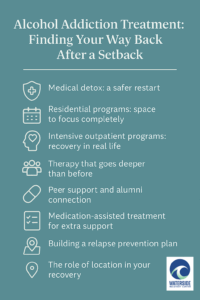Even when you’ve been building a sober life for months, one drink can feel like the undoing of it all. The guilt is heavy. The fear is louder than you’d like to admit. And the quiet thought that creeps in—“I blew it. They won’t understand.”—can keep you from reaching out.
But relapse doesn’t mean the story is over. It means something in your recovery plan needs to change. It means you deserve help that meets you where you are now, not where you were on day one. At Waterside Recovery’s alcohol addiction treatment program, we believe every return to treatment is a step forward, not back.
Why Relapse Doesn’t Erase Your Progress
A relapse can feel like it wipes away everything you worked for—but it doesn’t. Your sober days, weeks, or months before the slip are still part of your recovery history. They’ve given you insight, skills, and self-awareness you didn’t have before.
Sometimes, a relapse is a wake-up call to look deeper. Maybe the stressors you thought you could manage were stronger than expected. Maybe the coping tools you had weren’t enough in the moment. That’s not weakness—it’s information you can use to adjust your approach.
“I thought I was back at square one. But my counselor reminded me—square one this time wasn’t the same as before. I knew more. I’d lived sober before. That mattered.” – Alumni, 2024
1. Medical Detox: A Safer Restart
If alcohol is back in your system daily, stopping abruptly can be dangerous. Withdrawal symptoms like shaking, sweating, nausea, and even seizures can happen. A medical detox gives you 24/7 support, making the first step back into recovery safer and more comfortable.
Detox isn’t just about getting alcohol out of your body—it’s about setting you up for the next phase of treatment. At Waterside Recovery, our medical team monitors your health, manages symptoms, and helps you transition directly into therapy or residential care so you’re not left alone in those vulnerable first days.
2. Residential Programs: Space to Focus Completely
Sometimes, being back in the world too soon is what made staying sober so hard. A residential program gives you a break from daily triggers—whether that’s people, places, or pressures that fed your drinking.
Here, your only job is to heal. You’ll have a structured schedule, therapy sessions, and time for rest and reflection. It’s not hiding from reality—it’s preparing yourself to face it again with more strength and stability.
3. Intensive Outpatient Programs (IOP): Recovery in Real Life
If leaving home isn’t an option, an Intensive Outpatient Program lets you live at home while attending structured therapy several times a week.
This option works well for people who have work, school, or family responsibilities but still need significant support. It’s also a great fit if you’ve been through treatment before and want to strengthen your coping skills without stepping away from your daily life entirely.
For locals, choosing alcohol addiction treatment in Plymouth County, MA means less travel, more consistency, and support that’s rooted in your own community.
4. Therapy That Goes Deeper Than Before
If your last time in treatment focused mostly on the “how” of staying sober—tracking triggers, building structure—this time might be about the “why.”
Alcohol use often has deeper roots: unresolved trauma, mental health challenges, grief, or chronic stress. Addressing these underlying causes with approaches like trauma-focused therapy, cognitive behavioral therapy (CBT), or EMDR can make your recovery feel more stable and less like you’re walking a tightrope every day.
5. Peer Support and Alumni Connection
Relapse can make you feel like you’ve lost your place in the recovery community. But showing up again—especially in alumni groups or peer meetings—often reminds you that you still belong.
At Waterside, alumni events and groups welcome you back without judgment. It’s not about retelling your relapse story unless you want to—it’s about reconnecting with people who understand that recovery is rarely a straight line.
“When I walked back into group, I expected silence or side-eyes. Instead, someone said, ‘Glad you made it back.’ That was it. And it was exactly what I needed.” – Alumni, 2024

6. Medication-Assisted Treatment (MAT) for Extra Support
For some people, certain FDA-approved medications can reduce cravings or help maintain sobriety. MAT isn’t about replacing one substance with another—it’s about removing one more barrier between you and your recovery goals.
When used alongside therapy and support, MAT can help make staying sober feel less like a daily battle and more like a steady, sustainable way of living.
7. Building a Relapse Prevention Plan That’s Realistic
Recovery isn’t about perfection. A good relapse prevention plan accepts that life can be unpredictable—and prepares you for it.
This might include:
- Identifying early warning signs of stress or cravings
- Having a “first 24 hours” action plan if you slip
- Keeping a list of people to call or places to go when you feel at risk
- Scheduling regular check-ins with a counselor, even when you feel “fine”
8. The Role of Location in Your Recovery
Getting treatment close to home has benefits—your support network is nearby, and you can practice staying sober in your real environment. But for some, putting physical distance between themselves and old triggers is just as important.
Whether you choose to stay local or get away for treatment, the most important thing is finding a program that matches your needs. If you’re in Massachusetts, both Plymouth County and Bristol County have access to our programs, so you can choose the setting that feels right for you.
FAQ: Alcohol Addiction Treatment After Relapse
Q: Do I have to start from scratch if I relapse?
No. Relapse doesn’t erase your progress—it’s a chance to adjust your plan based on what you’ve learned. You still carry all the tools, insights, and experiences you gained in your earlier sober time.
Q: Will my treatment be different this time?
It can be. Many people change their treatment approach after a relapse—trying a higher level of care, adding therapy types, or exploring medication-assisted treatment.
Q: What if I can’t do inpatient care again?
Outpatient programs and virtual therapy options can provide significant support while allowing you to stay home, work, or care for family.
Q: How can I face my recovery community after a relapse?
Most recovery communities understand that relapse is common. Many will welcome you back without judgment. Alumni programs can be a softer re-entry point if you feel nervous.
Q: Can medication really help with alcohol cravings?
Yes. FDA-approved medications like naltrexone or acamprosate can reduce cravings or help you stay sober, especially when paired with counseling.
If you’ve relapsed, you haven’t failed. You’re still here. And there are more ways than ever to get back on track.
Call (866)671-8620 or visit our Alcohol Addiction Treatment page to learn more about our Alcohol Addiction Treatment services in Plymouth County, MA.


